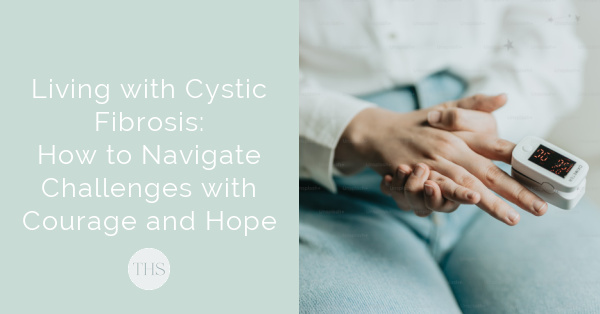3 Common Conditions That Herbal Medicine Can Help With

Living with any chronic illness is challenging on a level that most people can’t comprehend.
People tend to oversimplify things they don’t understand – so if you tell someone that you have cystic fibrosis and even if you explain it to them, they might see it as just “a little extra phlegm”! They don’t see the constant struggle with frequent lung infections, difficulty breathing, and a persistent cough. What’s worse is that repeated lung infections can cause lasting damage to your lungs.
And it’s not just the respiratory problems, it’s also the difficulties digesting and absorbing nutrients from food which, in turn, results in malnutrition and gastrointestinal problems such as pancreatic insufficiency. The impaired function of your pancreas also means that you may have difficulty absorbing fat-soluble vitamins, which then results in cascading health issues.
The physical symptoms of cystic fibrosis don’t occur in a vacuum; they have such a tremendous impact on mental and emotional health that many people just give up all hope. When other people have a bad day, they can just sleep it off but you have to develop the tools that will allow you to face one bad day after the next.
This is why regular therapy should be an important aspect of your treatment plan. Since in-person sessions can put you at risk, online therapy services offer a safer choice. You can check out this guide to online therapy services, which compares the leading platforms and includes info on what they are best for and their cost.
In addition to your therapy, you can also adopt coping strategies to overcome stress and anxiety so that you can improve your overall mood and mindset.
For instance, it might be a good idea to take a step back and assess your need for information. The internet provides a wealth of information within seconds – this is a good thing at most times, but sometimes, it can be terrible. You search for helpful info and instead, you’re faced with a deluge of scary first-hand accounts from people who claim to have cystic fibrosis. More often than not, these turn out to be fear-based marketing scams that promise miraculous results but obviously can’t deliver. This is why it can be helpful to limit how much online info you seek about cystic fibrosis.
There are several other coping strategies to deal with health-related anxiety. Different things work for different people, so you will need to try them to see what works for you.

Online groups are a great way to connect with other people who have cystic fibrosis and can understand the challenges that you face better than anyone else. There are several online communities for cystic fibrosis, and most of them have a strong presence on social media platforms.
However, make sure that you choose the right group – one that will give you the hope and courage you need and not one that pulls you into a negative feedback loop, which can happen easily when people are overwhelmed with pain and hopelessness. The best thing you can do is limit your interactions when you join a new group. This will give you time to assess if the group is really helping – do you feel more supported and do you have a more positive mindset after joining the group?
How often have you thought, “I wish people understood ___ aspect of my struggle with cystic fibrosis”? Even your family, friends, and those closest to you will never be able to truly understand so many aspects of your life – this can be extremely isolating.
Your loved ones might be unsure whether they can talk to you openly about your experiences or whether you would prefer to keep certain aspects private. Initiate a conversation with them about cystic fibrosis and make it clear what you are willing to discuss and what you would prefer not to talk about.
You can also cover the kind of help that you need and appreciate as well as the kind of “help” you don’t want. For instance, a well-intentioned relative might want to help you by offering to pay for healing crystals, healing sessions, or other treatments that are not science-based. You can politely tell them that you would prefer a more practical gift such as an airway clearance device instead.

Which brings me to my final point – ask for help. It’s often tough to ask for help because you think that people don’t understand what you are going through.
You are right – the people who love you don’t understand your struggle but they know that you face an uphill battle every single day. They want to help you but they also don’t know if you’re comfortable accepting help. While, you may take pride in your independence and self-reliance, you need to accept that there will be times when you need help.
If you are worried that you are imposing on them, give them a choice of tasks so that they can pick whichever ones work well with their own schedules. Allowing people to help you will also strengthen your bonds with them and reduce the effects of the psychosocial and psychiatric side of cystic fibrosis.
When you’re living with cystic fibrosis, there are no easy solutions to your problems. But hopefully these tips will offer you some support to stay brave and keep hope in your heart.
Author bio: Shaun DMello is a prolific writer who has worked with a wide range of health and wellness brands for over a decade. Aside from fitness, nutrition, natural medicine, and health care technology, he also has expertise in public health, sharing tips to cope with pandemics and natural disasters. When he’s not writing, you can find him reading a good book, curled up on a recliner, jostling for space with his four cats.